 |
| Sergei Letov sneers at the western culture. |
Poland, 1988
In pre-perestroika times, I happened to visit the SOLO DUO TRIO festival in Krakow. I recall that the Poles, when hearing Russian language, immediately asked to sell them Soviet rubles at a very high exchange rate as compared with the official rate. Arkady Kirichenko even organized a kind of a tongue-in-cheek auction at Krakow’s central square Rynek Glowny, selling a few tens, he found in his pouch. At the same time, a young Pole, with whom I fell into talk in a cafe after a concert, was very confused upon hearing that my younger punk-brother was singing in Russian. He couldn’t imagine this, to combine punk-rock and Russian language.
Due to some inevitable traditional Polish wheeling-dealing, the organizers bought return tickets for us only to Brest (probably, railway tickets to the USSR were sold for rubles, and those days in Poland they were in deficit and an item of speculation). They gave travel allowances in zloty and said we could easily buy tickets at the border for any train bound for Moscow. In the evening we arrived to Terespol and spent the entire night waiting for a train to the USSR. Brest was only in 3-5 kilometers from us, but it turned out that border guards and customs officers did not let anyone on and off passing trains – the border was locked. Finally, by hook or by crook, Akrady and I managed to get to some track, from which a shuttle train Terespol-Brest with four cars for border guards/customs officers. When we, loaded with cases with a trumpet, saxophones and a bass clarinet, climbed a ruined platform, a Polish border guard came up. I decided to demonstrate our loyalty and asked “in Polish”:
– Chy pochyong do Brestu tutay?
The guard got excited, took the gun off his shoulder, but then asked somewhat suspiciously in pure Russian:
– Are you guys from Moscow?
– Yeah…
– So why act fucking apish? Just say you need to get to Brest. Get on, we’re leaving in a minute…
***
Italy
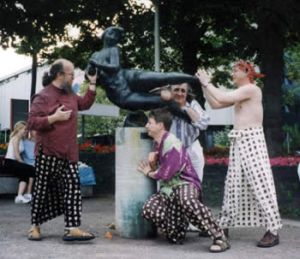 |
| Russian Saxophonic Mafia forces Lorelle on quay of Rhein. |
Once I was traveling on a train from Turin to Venice. A friend of mine, an Italian dancer, was sleeping with her head on my knees; to the right – a student. Having peeped in her notes I found out that she was studying Freud and psychoanalysis. Gradually, we stroke up a conversation. In front of us, elderly Italian women were boiling over cold in the compartment. Upon discussing this problem and receiving my consent, we decided to ask the steward to turn heating on. At the end of the scene, like in an Italian neorealism movie, the most curious grannies asked:
– What is your nationality, young man? Your companion is an Italian, no doubt. With the girl next to you spoke in German and English, with the steward – in Italian, but you’re sure is not Italian? So we made a bet…
– I’m Russian…
The Italian grannies started cluttering again, and I understood that nobody won. One of them said apologetically:
– Ah, Russian! Of course, they speak all languages!
Frequently visiting Italy in the beginning of the 90’s, I noticed that attitude towards Russians and Russia was very warm. I was astonished by their complete ignorance of politics and disregard of Gorbachev/Eltsin. Meanwhile, in Austria, at the Blue Tomato club in Vienna, during a concert of TRI “O” and Tuvinian singer Sainkho, the local menu had something like Jelzyns Fleisch (actually, this meal was called Teufels Fleisch – Devil’s filet) and some Gorbie stuff, in South Italy all associations were connected exclusively with Soviet football players, who succeeded in Italian A series clubs: Savaroff, Mikhailicenko…
 |
| Studying of the western culture. Practical employment in Italy. |
The Italians regard Russian as some wonderful Santa Russia, where even there are no homosexuals. For Italians, first of all, esthetic categories prevail over ideological ones: food, drinks, sex, theater, sports. That’s why they like the Russians. I remember the director of the Experimental Theater Center in Rome speaking, that if active, talented and collected Russians move to Italy after opening of borders, the Italians will have a hard time.
Italian leftists took collapse of communism in the USSR very heavily. For them it was not just collapse of the ideology as such, but discredit of the great idea by the country, which had no long-lasting traditions of municipal administration. In Rome, strange people used to take me for a German, probably because of my accent. When serving a cup of coffee they always added “Bitte!”. To cure from nostalgia, unlike Tarkovsky, I used to go to Rome’s Porto Portense, a large market, first conquered by the Poles for a short time, and then taken over by Russian gangsters. While walking through the market I always heard familiar “cant music”:
– Hey you, black-ass fuckwit! Where are you fucking going? Stop! Don’t’ move, I say! You’re gonna get it in the ass!
… And the smell of the motherland is no longer so sweet and pleasant.
***
Europe Middle Europe differs from Italy considerably. Italy is like an island with its own non-pan-European fashion, cuisine, attitude to history, with its own logic and morale. Europe is more unified and uniform. The brain of an average European is washed by mass media to ideal sterility. This means an unconditional belief in everything what TV and newspaper say. This belief multiplied by complete ignorance of what is actually going on in Russia, its history, culture, state structure, even natural environment, generate some absurd chimerical phantasmagorias. The most astonishing is that all the above-mentioned are equally applicable to intellectuals, who believe they are nonconformists, avant-gardists, fighters against the consumer society system, etc.
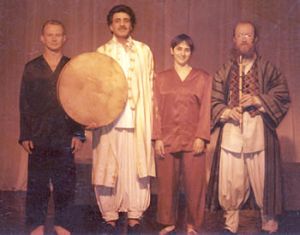 |
| Friendship of peoples: Jan Sutton (Great Britain), Reza Keramadan (Iran), Jovanna Summo (Italy), Sergei Letov – performance ” Death of prince Bessmortnogo (by Shah-Nàìå. An episode of fight Rusama and Isfendijara). Rome. Theatre In Trastevere, 1992. |
Actually, we also regard Europeans as extremely cultivated people. But their culture is different from what we are used to. This culture is limited mainly by ability to use a knife, a fork and a napkin: culture of a waiter or a clerk. For more than fifteen years I’ve been trying to find among those social groups with whom I have professional contacts – musicians, actors, writers, dancers, administrators – people who read Dostoyevsky. I mean those who really read, instead of watching American movies. The result is disappointing – only few people did. One of them, actually, not only read Dostoyevsky, but also Bakhtin’s works on Dostoyevsky, and this person was an avant-garde poet, a communist. So, what to say about
Even a friend of mine, a conceptual artist, a Buddhist, who organized several thousand protests against development of nuclear power industry in Bavaria and was persecuted by governmental authorities, believes that governments of Latvia and Estonia are absolutely right in banishing Russian population from the Baltic countries. So, what about common people? The general level of intellectual culture among educated classes is considerably lower than that in Russia.
Moscow conceptualists were the first to encounter this, when they went to the West in 1988-89 with their project ÈÑKUNSTÂÎ. The Germans even accused the Russians of intellectual arrogance. At that time, in 1989, a Dutch photographer-avant-guardist, when heard my explanations of principles of the second wave conceptualists (namely, of Sergey Vorontsov), was struck and soon invented me to Holland. As for the deceased Verner Ludi, a saxophonist who presented me with a baritone saxophone, which I’m still playing, couldn’t understand the sense of performances of Alex the Fascist (Alex Sobolev, a Moscow conceptual performer, also deceased).
 |
| the Image of Letov in Italian arts. |
Warm reception of the Russians-Soviets in Europe and America during the ÈÑKUNSTÂO period was explained not only by exotics, interest in the USSR and Russia, but by the fact that the cold war was at its final stage, and sometimes by pragmatic ambitions of the Germans for Germany reunion. All those events, visits to restaurants with scrupulously drawn-up bills, attached to financial reports and paid by hosts, somehow didn’t stick out. Disillusion came after collapse of GDR, and than – after breakup of the USSR. All old friendship disappeared, and paltry revenge for passed fears and self-abuse emerged. First I noticed this in Italy.
In 1991, during the anti-Gorbachev putsch, I played in Euripides’ “Alcestis” in Pompeii, at an excavated antic theater, with the already mentioned Experimental Theater Center of Rome. In a few days after they showed tanks in Moscow streets, I was offered political asylum on behalf of some union of musicians or actors. Of course, I turned them down and returned home as soon as possible. But in October, 1991, when I arrived to Parma for playing in the same “Alcestis”, after the first performance I got a call from police, who asked if I had permission to work in EU countries. I had to abandon everything and come back to Moscow…
At the same time, the Moscow writer Andrey Bychkov asked me to write an afterword to his book “Black Talented Music for the Deaf-and-Dumb”. Its main characters are some drug fiends, fascists, underground musicians and other freaks – so-called risk groups. Since it was almost about me, I had to write the afterword. So I wrote something like: “Imagine you’re invited for diner party at some embassy or a lunch in the ambassador’s residence. Everything was perfect; you thanked them for the meals and wonderful coffee. And they say: Don’t thank us, you’re lost anyway, it was just a game! And don’t pretend you didn’t understand it: ignorance does not exempt from liability. Here’s your bill!”
Curiously enough, Andrey Bychkov didn’t include my afterword. He said that the publishing house was “democratic” and they wouldn’t like it and refuse to publish the book. So they published it without by afterword.
***
France
 |
| Sergei Letov, Lev Trachtenberg (it is dared, yet does not know, that prepares it FBI and their friend À.G. In New Jersey, 2000) |
Things are even worse in France, the main Arabic country. However, I’d like to talk not about Paris – the capital of Africa, but about South France. In summer of 1998 I was in Toulouse at the French-Russian festival of contemporary arts “Garonne meets Volga” (Garonne is a river in the Pyrenees). What I didn’t like from the very beginning is that in the middle of the festival booklet, IN LARGE PRINT, there was some EMPHATICALLY PRINTED CHECHEN “FAIRYTALE ABOUT THE WOLF”. I defiantly opened the booklet and, in front of French festival workers who handed it to me, ripped out from the middle the insert with the tale, crumpled and threw it in a wastepaper basket.
The same fairytale was printed in large body-size on a poster, placed in the canteen for Russian participants. The guide, attached to dancers of the Expressive Plastique Class, whose performance I accompanied with my bass clarinet, occasionally frightened us with stories that some Chechens came to her, asking to show them Russian participants.
France is an unfortunate country, almost completely occupied by Negroes and Arabs, a country with the most terrible bureaucratic system. Down south, non-French urban population – Arabs, Negroes, Basques, Portuguese – amount to more than 40 percent. These people are distinguished by immense insanitariness and banditry. At the same time, the French create more obstacles in issuing entry visas to Russian citizens. Why?
In the Louver, in spite of many Russian tourists, there are no Russian-speaking guides. But there are Arabian-speaking. However, I saw no Arabs there at all. Nonetheless, underneath the Louver there is a huge book store, where a comic book for kids, describing a Chechen girl heroically killing Russian soldiers in many different ways, is in great demand, along with art albums! Well, why angry with the poor French? Once upon a time, Karl Martel stemmed the Muslim invasion at Poitiers. In more than one thousand years after, his descendants gave in without a struggle…
***
Germany
 |
| Seattle, S.Letov on a beach with a statue of freedom, 1990 |
Another situation can be recently observed in Germany. In spite of pan-European tendency of folding contacts with Russia and the Russians after eastward expansion of NATO and European Union, the Germans preserve some global interest. Probably, it is connected with a flood of emigrants from post-Soviet republics. In some German cities “the Russians” amount to 10% and more; they issue their newspapers, open their clubs, shops. The Russian community in Berlin is the most impressing.
The Russians, most likely, represent for the Germans just an attractive psychological and temperament type: I recall Berlin clubs DKB (a cultural center in Berlin) on Tor-Schtrasse and Russkoee Polee on Zinowitzer-Schtrasse. In the latter, the Russians were not just allowed for free, but were served with vodka and champagne, while the Germans, quietly sitting along the walls, having paid a lot for a glass of red wine, watched the gradually escalating debauch and “empathized”.
Without a sound, works of St. Pete necro-realism were projected on bleached walls of a former GDR factory; cock-eyed post-punks dressed in rubber chemical protection overalls were climbing some “nuclear dumps”. A long-legged German chick came up to me with a glass of wine and asked me suavely:
– You must be a Russian artist?
– No, I’m a musician.
– Oh, how interesting!
***
America
In 1990, TRI “O” visited the United States for the first time, in the framework of Good Will Games. There were a lot of funny and absurd things happening there. When we were flying from Seattle back to New York, at the airport, the bassoon player, Alexander Alexandrov, decided to use a lift, like a white man, instead of rushing to the departure gate. Where he finally arrived is unknown. When the plane with passengers started driving away from the airport to the runway, I drew the stewardess’ attention to the empty chair next to me, and told her that one passenger was missing. Surprised, she counted the heads and announced through the airport loudspeakers that Mr. Alexandrov is awaited at some departure gate. Some time later, the foamy Bassoon finally plunked himself down on the chair next to me.
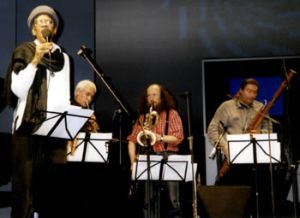 |
| Gin Lee, THREE “O” |
When later, trying to accommodate our cases with bassoons/bass clarinets I told the stewardess that we are Russians from the USSR, she didn’t believe it. Probably, her knowledge of the Russians was limited by James Bond movies (KGB colonel Lermontov), but we, with our fluent English, did not correspond to it. Our tuba player did not speak English, but looked very American, sleeping with fashionable TURBO sunglasses, walkman’s headphones on, a Hawaiian shirt… Some time later, she called me and whispered, that having checked and found out that we were really Russian, the crew presented us with a bottle of cognac, champagne and souvenirs. And when the passenger Mr. Alexandrov drank all the cognac alone, right from the bottle, and fell asleep, it seemed that she definitely made sure we were Russian.
The Americans know about Russia even less than Europeans. Most of the nation doesn’t even know on which continent Russia is situated, what peoples inhabit it, what languages they speak…
One summer, when I was in Avignon (Provence, South France), I decided to visit Arles, a city where van Gogh used to work. There, at a little railway station, waiting for a train, I noticed that one elderly lady forgot a purse on the bench. I tried to draw her attention, shouting “Madame, you lost…”, but she toddled away without taking a notice of my warning. I had to run after her and give the purse to her. It turned out that she did not speak French.
She was an American pianist, touring in France. In her purse she had not only credit cards and money, but also the passport and plane tickets. We stoke up a conversation. I had a New York T-shirt on, and the pianist asked where I had come from to New York (meaning that if I was an emigrant, where I arrived from). When I answered that I was not from the Big Apple, but lived in Moscow and, moreover, played saxophone at the Avignon festival, the lady was heart-struck, even more than by the fact that she nearly had lost her money and documents. When she asked about weather in Moscow and when I replied that it was warmer than in Arles, she definitely did not believe me: how could one walk in Moscow without a fur-cap on?
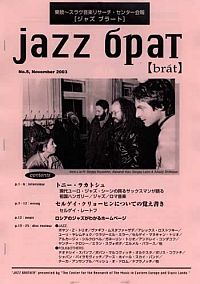 |
| The JAZZ-brother, November 2003 |
Some of our compatriots contribute to absurd and fantastic stereotypes about Russia, prevailing in consciousness of the Americans. A friend of mine, a former Moscow guitar player, gives out-of-school classes to foreigners about Russian culture. He has a car and receives inquiries for Russian culture lectures on the answering machine. His lecture is very simple and unsophisticated, like the American culture itself: dressed in Ukrainian embroidery shirt, Misha plays a Germany-made souvenir balalaika, occasionally bought in Berlin, and sings something like “The moon is shining”, sings to a guitar some Gypsy romances, shows a photocopy of the Russian alphabet and teaches one phrase in Russian. This phrase proves that Russian language differs from English, but not very much: “NYET PROBLEM”, which corresponds to English ”NO PROBLEM”.
Funny enough, Misha traveled over 46 states with such lectures. He was delighted most of all by an Indian chief in some reservation in Indiana. When the chief learned that Misha is a Jew, he asked for permission to touch him. It turned out that Indians of his tribe had heard from missionary people about a mysterious tribe of Jews, but they had never seen real alive Jews (especially from Russia!).
Results of such mixture of concepts are quite common. In 1996, in Birmingham, Alabama, during my concert with LaDonna Smith, volunteers decided to announce it among the Jewish community of Birmingham (according to one volunteer, “the Russians are ethnically close to Jews, aren’t they?”). Actually, before my visit to Birmingham they never had seen any Russian (like those Indians in the reservation) on stage, probably, except for some ballet. Imagine my surprise, when in the Birmingham Art Center, at a concert of super-highbrow improvisational music, I saw some moss-covered bearded people from God-forsaken small places in Ukraine and Byelorussia. Some of them brought rubber boots to pass over to his granddaughter, some brought jars of honey with the same intention. They were quietly sitting there, understanding absolutely nothing…
One year before 9/11, actors of Taganka Theater played Venedikt Erofeyev’s “Moscow-Petushki” over the East Coast. The tour was organized, of course, by the Russian producer Lev Trachtenberg, who recently was in the spotlight due to charges brought by FBI against him for forcing of female emigrants form Ukraine into striptease in American bars (by the way, striptease is legalized in the USA, but in some states only “forcing into it” is prosecuted).
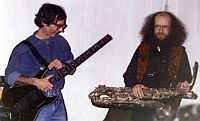 |
| Sergei Letov and Davy Villjams, 1996 |
… From Rockwell, near Washington, where we played, the trailer with our company arrived to New Jersey at the dead of night. With my girlfriend I went to her home in Brooklyn. I called a taxi and a black guy arrived. When we were approaching the tunnel under Hudson, he started yammering, asking for $4 in advance for driving through the tunnel. I gave him $50. We left Manhattan, the taxi driver’s principal place of business, behind. This bonehead kept on chattering with my girlfriend and asked her about our nationality. When he heard we were Russian he became serious and said that he always respected strong people.
When we arrived to Brooklyn, it turned out he was completely unfamiliar with it, not knowing how to get to out street. Manhattan, except for its southernmost part, is quite simple, but Brooklyn is similar o Moscow. Intuition is not enough to get from the Brooklyn Bridge to the 8th East St. After contradicting instructions of my girlfriend and me, the black taxi driver suddenly turned to a side street. He stopped by a night junk fast-food stand. Half a dozen of Blacks besieged the car, sticking their hands inside, up to shoulders, first asking for small change, then just for money. And here the taxi driver said a magic phrase: “They are Russians”.
 |
| Last jazz ether of the Millenium on WDR, Mal Waldron, Gin Lee, Three “O”, Roman Bunka, Grace Yoon, Blixa Bargeld) |
Hands were withdrawn from the car immediately, and the Blacks stepped aside, discussing something. Later, one of them wished to accompany us, absolutely for free. He climbed the footboard of a yellow UPS car, and we followed him until he showed us the street we were looking for. He saluted us goodbye and left, still standing on the footboard of the UPS car.
It is well-known that immigrants from the USSR – the Georgians, Azerbaijani, Tartars, Jews and Chukchee – after moving to the USA, immediately become Russian, forming a “new historical community”, the one that communist ideologists were dreaming of, and which came true, first of all, in the consciousness of a Western man. Moreover, people of different races, bearing “RUSSIANS” brand, in such a peculiar way provoke unrealizable fantasies in minds of some Americans.
Once I stayed in New York, in the Golden Lion Hotel in Manhattan. When I was busy packing to leave for the airport, the receptionist told me that their hotel was served by a bus, carrying their guests to necessary terminals for quite a low charge. On the way to La Guardia Airport, a conversation started between me, the only passenger, and the driver, native of Ecuador. This Indian confessed that he would like to go to Russia TO BECOME RUSSIAN.
Generally speaking, the Western world is less dialectical, than the Russian world; it is more, so to speak, monochrome. Everything is black or white. People there are less curious; they are little interested in what is beyond their immediate basic interests and job duties.
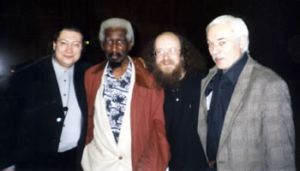 |
| (Alexander Aleksandrov, Mal Waldron, Sergei Letov, Jury Parfyonov, Cologne 1999, Last Jazz Ether of the Millenium on Westdeutsche Rundfunk) |
Once we were sitting in a cafe somewhere in Alabama with an emigrant for the USSR, a former accompanist of Janna Bichevskaya, and spoke, as it is accepted among the Russians of my generation, about abstract things: about Atman, asuras and devas, immortality of the soul, Chang school, different meditation techniques in India and Far East, hesychasm, Florensky, Leibniz, etc. Heated with dispute, we raised our voices. Then we noticed that the American ladies, accompanying us, a dancer/manual therapist and a musician, were watching us with their eyes wide open. My friend apologized, explaining that it is quite common among the Russians of our generation to dispute about abstract things. One of the Americans signed and mentioned sadly:
– Education is cool!
Once LaDonna Smith took me to a wonderful American musician Davy Williams (his repertoire covered everything, from blues to free improvisation). Davy, one of the best guitarists in the South, was then making his living by painting bridges (or fences, like Tom Sawyer?). He asked me:
– Would you agree, if MTV offered you to make a video&
I answered that probably I would.
There was long, heavy and puzzled silence. Then Davy summarized:
– He is Russian. Probably, that is why he does not understand many things in this world. Then he continued:
– MTV is the center of all this shit we’ve been always fighting by free improvisation. How do you dare to work with them after all this?!
For Davy and LaDonna, for American nonconformists-avant-gardists the world is really black and white: either to be in the center of this establishment shit, or to wage a systematic guerilla war against it, developing parallel artistic structures. Their credo: to negate all values, adopted in the mainstream and replace them with their opposites. The Swiss Werner Ludi had a similar point of view, but his struggle was aimed against consumerism and Americanism.
People in the West are more monosyllabic, one-dimensional, predictable, close to mechanisms, less individual and variable than the Russians, the Russians in a general sense, but not as a line in the passport. Western people are credulous to propaganda and easily digest what mass media, the Ministry of Truth, stuffs them with. At the same time, due to their pragmatism, chariness – including their parsimony in brainwork, emotions, interests – they are very limited in their knowledge, in everything beyond their immediate practical needs. They want to just what they have to and … nothing more. They never challenge their knowledge. What they don’t know does not deserve knowing, it is of no interest. The Americans are the most successful in this self-restriction – they are absolutely sure that they live in the only right and the best country in the whole world, and many of them believe that they must make happy all the miserable once beyond the USA with their power and their values.
Consciousness of most of the Europeans, Americans and, perhaps, of Far East post-industrial people is full of cliches, stereotypes, which substitute their identity. Take Haruki Murakami, for instance, – the guy wrote thousands of pages about how he ate a hamburger or hot-dog, washed it down with coke or coffee, listen to a music in his car. 1984, Orwell wrote about, has already begun for them. They already exist as mechanical attachments to the senseless production/consumption machine.
So, if the Ministry of Truth decided to represent Russian in this or that image, everyone – clerks, peasants, truck drivers, rock musicians, gays and junkies, roughnecks and eggheads – would prefer to take it for granted, rather than to find the truth, which doesn’t concern them and knowledge of which is not paid for. There was one command during the period of perestroika and glasnost: the Russians are good, they need to be loved and taken care of, no matter what. So they loved us, applauded, bought paintings. Then another command was issued – “Russian mafia”, “violation of human rights in Chechnya”. Both commands, as they say, were correct.
But what is correct in fact?
Also read:
Sergey Letov
Brief History of New Improvisatory Music in Soviet Russia
Sergei Letov
Capitals, Province and Emigration
Leave a Reply